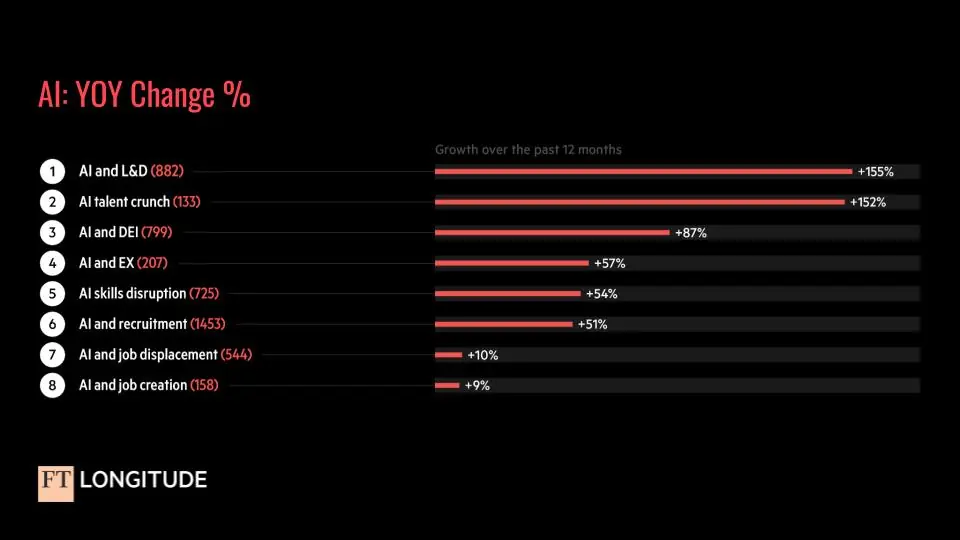Leading the AI shift: turning disruption into opportunity

Artificial intelligence (AI) has evolved from a source of uncertainty to a cornerstone of opportunity, particularly in the context of the future of work. At our recent “Thought leadership for the evolving people agenda” event, we explored how organisations can lead this narrative shift, moving beyond fears of displacement to a more balanced understanding of AI’s transformative potential for both businesses and employees.
Shifting the AI narrative
Initial concerns about AI-driven mass job displacement have given way to a more measured conversation about its capacity to augment human capabilities. Organisations are now exploring AI’s role in enhancing learning and development, improving recruitment processes, and boosting overall employee productivity.

Future of Work media topic trends analysis, December 2024
The focus has shifted from automation alone to how AI can amplify human potential and create new value. For instance, recruitment processes now benefit significantly from AI tools. These tools analyse CVs, predict candidate success, and even conduct initial screening interviews, streamlining hiring processes while freeing up time for strategic decision-making. Companies such as MasterCard are demonstrating how AI can transform HR functions, using these technologies to gain efficiency while enabling HR professionals to focus on value-driven work.
The evolving AI talent landscape
AI is intensifying the war for talent, as organisations must attract specialised AI professionals while simultaneously equipping their broader workforce with essential AI skills. A recent Confluent study revealed that 68% of IT leaders identified “insufficient skills and expertise” as the primary barrier to rolling out AI initiatives. Addressing this gap requires strategic talent management, including:
- Integrating AI literacy into learning and development programmes to upskill employees across the organisation.
- Focusing on soft skills such as adaptability, creativity, and critical thinking, which are essential for thriving in an AI-augmented workplace.
This evolving talent dynamic underscores the importance of understanding the mix of skills needed at all levels and identifying strategies to attract and retain top talent.
AI ethics and inclusion
The integration of AI into HR strategies also presents opportunities to address diversity, equity, and inclusion (DEI). While AI has the potential to reduce bias and improve workforce visibility, ethical concerns around algorithmic fairness must be prioritised. Organisations must implement frameworks to mitigate bias and build trust in AI-driven processes, ensuring they are inclusive and equitable for all employees.
AI’s role in DEI can be seen in its ability to provide real-time insights into diversity metrics, workforce engagement, and productivity. These insights enable leaders to make data-driven decisions that foster fairer and more inclusive workplaces.
Transforming the employee experience
Another key area where AI is reshaping the workplace is the employee experience. By enabling seamless, personalised interactions, AI mirrors the consumer-grade experiences employees expect. From tailored learning paths and real-time feedback to instant HR support, AI transforms how employees engage with their organisations.
Practical applications include:
- Streamlined recruitment and onboarding processes.
- Enhanced workforce management, including flexible shift scheduling and task automation.
- Improved learning and development through personalised training programmes that adapt to individual needs.
By positioning AI as a tool for empowerment, rather than displacement, organisations can foster trust and increase adoption. Employees are more likely to embrace AI when they understand its role in supporting their work, rather than replacing it.
Key AI trends in the future of work
Looking ahead to 2025, several trends will shape the AI narrative in the workplace:
- Addressing the talent crunch: The need for AI specialists and widespread AI literacy will remain a priority. Successful organisations will integrate AI upskilling into their workforce strategies while promoting critical human skills.
- Building trust through ethics and inclusion: Addressing algorithmic bias and fostering fairness in AI systems will be essential for creating inclusive workplaces.
- Consumerised employee experiences: AI will continue to deliver personalised, seamless interactions, improving satisfaction and engagement across the workforce.
Practical takeaways for AI adoption
Organisations looking to lead in AI thought leadership must:
- Highlight tangible examples of AI improving HR functions and business outcomes to inspire confidence.
- Address ethical concerns head-on, showcasing clear frameworks for mitigating bias and ensuring fairness.
- Emphasise AI as a tool for empowerment, amplifying human potential rather than replacing it.
Shaping the future of work
Ultimately, AI offers organisations a powerful tool for enhancing workforce dynamics, improving operational efficiency, and unlocking untapped talent pools. By taking a strategic and ethical approach, businesses can position AI as a driver of opportunity, innovation, and inclusion, paving the way for a more adaptable, empowered, and human-centric workplace.
As the AI narrative continues to evolve, thought leadership from brands that can guide the way on how to embrace these principles will be at the forefront of shaping the future of work — one that balances technological progress with human potential.
Want to learn more about the AI shift impacting the future of work?
Watch our on-demand webinar to explore these trends in greater depth. Featuring insights from Isabel Berwick, Emma Codd, and Jeremy Levene, we’ll distil highlights from our discussions to help you craft thought leadership that stands out in 2025.
Watch hereSign up to the newsletter
We help organisations stand out, speak with authority and spark inspiration, so change can happen. That’s real intelligence with influence. Sign up to our newsletter to get regular updates.
Subscribe






 Back
Back

 Book a meeting
Book a meeting
 Book a meeting
Book a meeting

